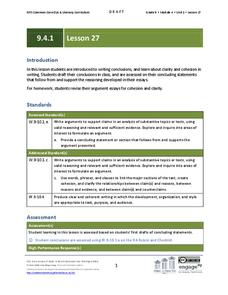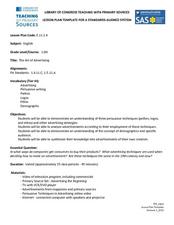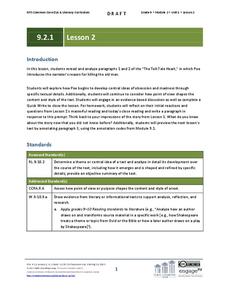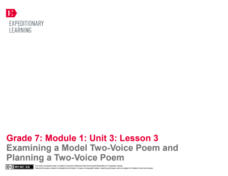Curated OER
English Lesson Plans for Grade 7
Discuss the correct use of certain phrases such as "managed" and "could" in this English lesson. Middle schoolers listen to interviews on work customs in different countries and compare them. They make inferences after reading given...
EngageNY
Grade 9 ELA Module 1: Unit 3, Lesson 11
The study of Romeo and Juliet continues as pairs use the provided summary tool worksheet to record evidence of how Shakespeare uses dramatic irony to heighten the tension in Juliet's soliloquy in Act 3, scene 2, lines 1–31.
EngageNY
Grade 9 ELA Module 3, Unit 2, Lesson 10
Ninth graders continue their inquiry-based research projects focused on the topics in Temple Grandin's Animals in Translation. After formulating, honing, and adapting their research frames in the previous lessons, learners select...
EngageNY
Planning the Introductory and Concluding Paragraphs of the End of Unit Assessment Essay
Preparation is the key to success! Using the guiding resource, scholars plan their end-of-unit analytical essays' introductory and concluding paragraphs based on their reading of Inside Out & Back Again. To prepare, they complete a...
Curated OER
Lesson Plan for The Little Red Hen
Cultivate young performers while teaching them about helping one another with this interactive storytelling lesson. Elementary schoolers read or listen to the story The Little Red Hen by Mike Lockett and then act out the story while...
EngageNY
Planning for Writing: Introduction and Conclusion of a Literary Argument Essay
After completing three body paragraphs of an argument essay about life's rules to live by from Bud, Not Buddy Christopher Paul Curtis, it's time to begin writing the introduction and conclusion. Independently, pupils draft the final two...
EngageNY
Grade 9 ELA Module 4, Unit 1, Lesson 27
Crafting a clear and cohesive conclusion to any piece of writing is crucial. An effective conclusion restates the central claim in the introduction, briefly summarizes the supporting claims, and presents a new way of thinking about the...
EngageNY
Informational Essay Planning: Analyzing and Selecting Evidence
Class members look again at the end-of-unit essay prompt for A Mighty Long Way. After reviewing the requirements of the essay, they use their Gathering Evidence note-catchers and color-code the evidence that matches the two questions in...
Torrey Maldonado
Anti-Bullying & Conflict-Resolution Lesson
Invite your class to consider how to respond to a conflict. Designed to be used alongside Secret Saturdays by Torrey Maldonado, a lesson plan focuses on a set of terms: conflict, escalate, deescalate, conflict resolution, denial, and...
Curated OER
Lesson Plan 18: Cleaning It Up
Careful proofreading is an important step in the writing process. After guided practice using a provided worksheet that details common grammar concepts, young writers refer to the worksheet as they proofread their own work. Although the...
PBS
Does Art Imitate Life?
Write what you know, sound advice for any writer and something many famous authors are known to have done. Use these materials to explore how Shakespeare's life influenced his plays. This resource is packed with readings, video segments,...
Curated OER
The Art of Advertising
Get your class thinking about advertising with this lesson plan. Over the course of 15 days, your class will discuss advertising techniques, study the concepts of pathos, logos, and ethos, and analyze the persuasive techniques of...
National Council of Teachers of English
Timelines and Texts: Motivating Students to Read Nonfiction
With the emphasis on incorporating more nonfiction in language arts classes the question arises about how to design activities that motivate kids to engage with informational text. How about an assignment that asks class members to...
Curated OER
Agriculture Awareness Through Poetry
Whether you are viewing a landscape painting of a farm, examining a still-life portrait of a bowl of fruit, or reading a descriptive poem about cultivating food, you can't deny that agriculture plays a major role in visual and language...
EngageNY
Looking Closely at Stanza 3—Identifying Rules to Live By Communicated in “If”
Just as Bud, from the novel Bud, Not Buddy by Christopher Paul Curtis, had rules to live by, so does the poem, If by Rudyard Kipling, but how do the two relate? Pupils delve deep into the poem's third stanza, participate in a grand...
EngageNY
Grade 9 ELA Module 2: Unit 1, Lesson 2
Make up your mind to complete a lesson plan about "The Tell-Tale Heart" and forever rid yourself of simple sentence structures. As ninth graders analyze the first two paragraphs of Edgar Allan Poe's short story, they consider how text...
Curated OER
Personification Lesson Plans and Resources
This resource on personification provides three different approaches aimed at different levels. The first, appropriate for upper elementary, provides examples of personification, followed by an exercise that requires replacing a word in...
EngageNY
Writing, Critique, and Revising: Two-Voice Poems (Chapter 14: "Las Ucas/Grapes")
Continue work on the two-piece poem that compares two characters from Esperanza Rising. Give class members a few minutes to finish their drafts. After they have a complete product, model how to critique and edit the poems with one group....
Curated OER
Reading and Responding: Lesson 9
Follow this lesson, which is written more like a script, to practice reading a poem with your class. Pupils read "The Road Not Taken" and respond to five multiple choice questions on a provided worksheet. The plan leads you through a...
Maryland Department of Education
The Concept of Identity Lesson 8: Propaganda in Visual Media
Visual and print propaganda are featured in a lesson that asks readers of A Separate Peace to examine the techniques used in propaganda from World War I, World War II, presidential elections, and in the novel.
EngageNY
End of Unit 2 Assessment: A Hosted Gallery Walk
Speak your mind. Scholars present their claims in groups of three. They use a presentation checklist as each member takes a turn. At the end of the lesson plan, pupils complete an End of Unit 2 Assessment: Presenting a Claim and Findings...
EngageNY
Examining a Model Two-Voice Poem and Planning a Two-Voice Poem
Successful poetry writing requires three P's: planning, preparation, and practice. Pupils read a model two-voice poem and discuss how the author uses evidence to develop the theme. With a partner, scholars use a rubric to analyze the...
Curated OER
Lesson: Double Album: Pick up the Right Things
Kids consider contemporary art as a forum for modern culture. They engage in a discussion about poetry and art that expresses feelings of surrealism and schizophrenia. They then create a collection of material objects and compose a paper...
Curated OER
Lesson: Urs Fischer: Controlling our Logic, Metaphors, and Semantics
Kids use poetry and contemporary art to start thinking about logic and personal expression. They read Sylvia Plath's poem "Metaphor," and critically examine the art of Urs Fischer. After working though a few logic problems they write...

























